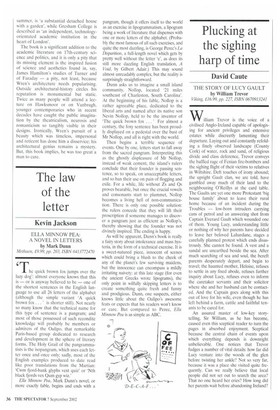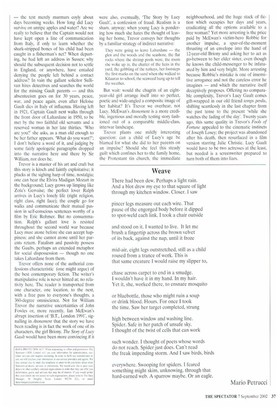Plucking at the sighing harp of time
David Caute
THE STORY OF LUCY GAULT by William Trevor Viking, £16.99, pp. 227, ISBN 0670913241 William Trevor is the voice of a civilised Anglo-Ireland capable of apologising for ancient privileges and extensive estates while discreetly lamenting their departure. Laying out and constantly refolding a finely observed landscape (County Cork) of water, rock and sand, of religious divide and class deference, Trevor conveys the baffled rage of Fenian fire-bombers and the sighing flight of their victims to relatives in Wiltshire. Deft touches of irony abound; the upright Gault clan, we are told, have gambled away much of their land to the neighbouring O'Reillys at the card table. The Gaults are yet one more Protestant 'big house family' about to leave their rural home because of an incident during the Troubles — low-born intruders carrying cans of petrol and an answering shot from Captain Everard Gault which wounded one of them. Young Lucy, understanding little or nothing of why her parents have decided to leave her beloved Lahardane, stages a carefully planned protest which ends disastrously. She cannot be found. A vest and a sandal are unearthed beside the sea. After much searching of sea and soul, the bereft parents desperately depart, and begin to travel; the haunted mother, Heloise, refuses to settle in any fixed abode, refuses further inquiry about Lucy, refuses even to inform the caretaker servants and their solicitor where she and her husband can be contacted. And the Captain goes along with this out of love for his wife, even though he has left behind a farm, cattle and faithful tenants to be cared for.
An assured master of low-key storytelling, Sir William, as he has become, caused even this sceptical reader to turn the pages in absorbed enjoyment. Sceptical because the central chain of events upon which everything depends is downright unbelievable. One notices that Trevor fudges a number of vital details: how far did Lucy venture into the woods of the glen before twisting her ankle? Not so very far, because it was a place she visited quite frequently. Can we really believe that local people did not set out to search the area? That no one heard her cries? How long did her parents wait before abandoning Ireland? — the text merely murmurs coyly about days becoming weeks. How long did Lucy survive on unripe apples and water? Are we really to believe that the Captain would not have kept open a line of communication from Italy, if only to learn whether the shark-stripped bones of his child had been caught in a fisherman's net? When departing, he had left an address in Sussex; why should the subsequent decision not to settle in England, or anywhere, have entailed denying the people left behind a contact address? In vain the gallant solicitor Sullivan hires detectives and searches the world for the missing Gault parents — and this absenteeism goes on for 30 years, peace, war, and peace again, even after Heloise Gault dies in Italy of influenza. Having left in 1921, Captain Gault next walks through the front door of Lahardane in 1950, to be met by the two faithful old servants and a reserved woman in her late thirties. 'Who are you?' she asks, as a man old enough to be her father appears. 'What do you want?'; I don't believe a word of it, and judging by some fairly apologetic paragraphs dropped into the narrative here and there by Sir William, nor does he.
Trevor is a master of his art and craft but this story is kitsch and faintly exploitative; it plucks at the sighing harp of time, nostalgia; one can hear the Elvira Madigan Mozart in the background; Lucy grows up limping like Zola's Gewaise; the perfect lover Ralph arrives in Lucy's lonely life (right religion, right class, right face); the couple go for walks and communicate their mutual passion in self-conscious sentences worthy of a film by Eric Rohmer. But no consummation. Ralph's gallant love is resisted throughout the second world war because Lucy must atone before she can accept happiness; and she cannot atone until her parents return. Fatalism and passivity possess the Gaults, perhaps an extended metaphor for social dispossession — though no one takes Lahardane from them.
Trevor offers none of the authorial confessions characteristic (one might argue) of the best contemporary fiction. The writer's manipulative role is never hinted at; no relativity here. The reader is transported from one character, one location, to the next, with a free pass to everyone's thoughts, a 360-degree omniscience. Not for William Trevor the narrative uncertainties of John Fowles or, more recently, Ian McEwan's abrupt insertion of `B.T., London 1991', signalling in Atonement that the story we have been reading is in fact the work of one of its characters, the girl Briony. The Story of Lucy Gault would have been more convincing if it were also, eventually, 'The Story by Lucy Gault', a confession of fraud, Realism is a sham, anyway: when young Lucy is pondering how much she hates the thought of leaving her home, Trevor conveys her thoughts by a familiar strategy of indirect narrative:
They were going to leave Lahardane — the glen and the woods and the seashore, the flat rocks where the shrimp pools were, the room she woke up in, the chatter of the hens in the yard, the gobbling of the turkeys, her footsteps the first marks on the sand when she walked to Kilauran to school, the seaweed hung up to tell the weather.
But wait: would the chagrin of an eightyear-old girl arrange itself into so perfect, poetic and wide-angled a composite image of her habitat? It's Trevor we overhear, not Lucy. McEwan's Atonement is a more credible, ingenious and morally testing story fashioned out of a comparable middle-class, interwar landscape.
Trevor plants one mildly interesting question: can a child of Lucy's age be blamed for what she did to her parents on an impulse? Should she feel this steady guilt which confines her to the family home, the Protestant tin church, the immediate
neighbourhood, and the huge stack of fiction which occupies her days and years, eradicating all the options available to a free woman? Yet more arresting is the price paid by McEwan's victim-hero Robbie for another impulse, a spur-of-the-moment thrusting of an envelope into the hand of 12-year-old Briony and asking her to act as go-between to her elder sister, even though he knows the child-messenger to be infatuated by him and very bright. More arresting because Robbie's mistake is one of insensitive arrogance and not the careless error he imagines — and which the narrative itself deceptively proposes. Offering no comparable complexity, Trevor's Lucy Gault comes gift-wrapped in our old friend temps perdu, shifting seamlessly in the last chapter from the past tense to the present 'while she watches the fading of the day'. Twenty years ago, this same quality in Trevor's Fools of Fortune appealed to the cinematic instincts of Joseph Losey; the project was abandoned after his death, then resurfaced in a film version starring Julie Christie. Lucy Gault would have to be two actresses at the least, but needed is a screenwriter prepared to turn both of them into liars.



























































 Previous page
Previous page